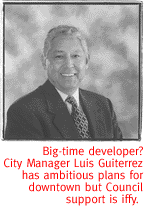
A New City Hall, Or Better-Paid Cops?-Council Members May Soon Reveal Their Priorities.
By Dave Devine
IT SEEMED LIKE such a simple, straightforward proposal
only a few weeks ago: Build a new City Hall and help revitalize
downtown. Construct other needed municipal facilities at the same
time--and do it all without raising taxes. Sounded like a winning
idea.
But then the critics got hold of the proposal, a pet project
of Tucson City Manager Luis Guiterrez.
Some critics argued the money would be better spent on more pressing
problems. Others complained that Stone Avenue at Pennington doesn't
need to be revitalized, while the east side of downtown does.
And lately there have even been rumblings of a citizen's initiative
to require a public vote on the whole issue.
 Things were so much easier in late 1961, when the basement and
first floor of the current City Hall were dedicated. Using voter-approved
bonds, the $625,000 project had some cost overruns, but they were
eventually resolved. Six years later, again funded by voter-approved
bond money, the structure's $1.9 million, nine-story tower was
completed after more cost overruns were settled.
Things were so much easier in late 1961, when the basement and
first floor of the current City Hall were dedicated. Using voter-approved
bonds, the $625,000 project had some cost overruns, but they were
eventually resolved. Six years later, again funded by voter-approved
bond money, the structure's $1.9 million, nine-story tower was
completed after more cost overruns were settled.
This year, critics of Guiterrez' New City Hall proposal have
raised the question, why doesn't the city go to the voters again?
Voters could be asked to approve an increase in property tax rates
to pay for general obligation bonds to finance the construction.
This is the typical way local governments finance capital projects.
The simple answer is that the $75 million price tag on the new
City Hall proposal is far too expensive for the standard financing
method. Arizona's Constitution places a cap on the amount of general
obligation bonds a city can sell. Tucson is now about $25 million
under that limit.
 According to Kay Gray, the city's finance director, there may
be $60 million available by the time of a possible bond election
in the year 2000. But, she says, almost all of that money will
be required to meet the cost of mandated programs like environmental
cleanup, and to provide more police and fire-fighting services.
According to Kay Gray, the city's finance director, there may
be $60 million available by the time of a possible bond election
in the year 2000. But, she says, almost all of that money will
be required to meet the cost of mandated programs like environmental
cleanup, and to provide more police and fire-fighting services.
So instead of using general-obligation bond money, city officials
say they want to cover construction costs with funds which can
be used for any municipal purpose. In other words, the City Council's
decision on the proposal will show where their priorities are.
Do they want to hire additional cops or pay the current ones
more money instead of constructing a new City Hall? They could
also subsidize affordable housing, build parks, fund social programs,
put more buses on the street, or even lower taxes. The money needed
to finance this project could actually be used to reduce, or even
eliminate, the city's primary property tax.
Traditionally the city has earmarked a chunk of general funds
to pay off debt resulting from capital projects--constructing
the addition to the Convention Center, building a new northside
police substation, and providing a headquarters for the city's
Information Technology Department. But the Council doesn't have
to continue that tradition. It can use most of the money any way
it wants.
Critics have raised other concerns about the new City Hall proposal.
They've pointed out that parking is a potential problem. Spaces
are always at a premium downtown, and because the proposal would
bring Parks & Recreation Department employees downtown, they
warn, the parking situation will grow even worse. Plus, easy public
access to Parks & Rec personnel, a real advantage of the department's
current site in Reid Park, will be diminished.
Precisely where a new City Hall should go is another contentious
issue. Anne Lawrence, who lives in downtown's Armory Park neighborhood,
thinks the new building should be used to encourage that area's
revitalization. Stone Avenue near the Main Library doesn't need
help, she says, but downtown's outlying eastside neighborhoods
do.
Lawrence says this approach was the direction taken by the city's
1994 Downtown Strategic Plan. She also argues that existing infrastructure
available on the library site should be used to attract a private
investor to build there.
Plus, the revitalization benefits of this proposal are being
blown way out of proportion. Where the new City Hall goes, if
it is built, won't make or break downtown Tucson in the long run.
It promises to be a lively discussion when the City Council meets
on Monday to hold a public hearing on the proposal. Some Council
members have also been intensley critical of the idea, despite
some strong support from city staffers.
The Council will be faced with a decision about whether to continue
its historical level of spending on capital projects or redirect
the money to other needs. At the same time it will have to consider
the possibility of placing the item before the voters this November
as an advisory-only question.
All in all, it should make for a interesting evening.
The public hearing on the proposed new City Hall and other municipal
facilities will be held at 7:30 p.m. Monday, August 17, at City
Hall Council Chambers, 225 W. Alameda.

|





